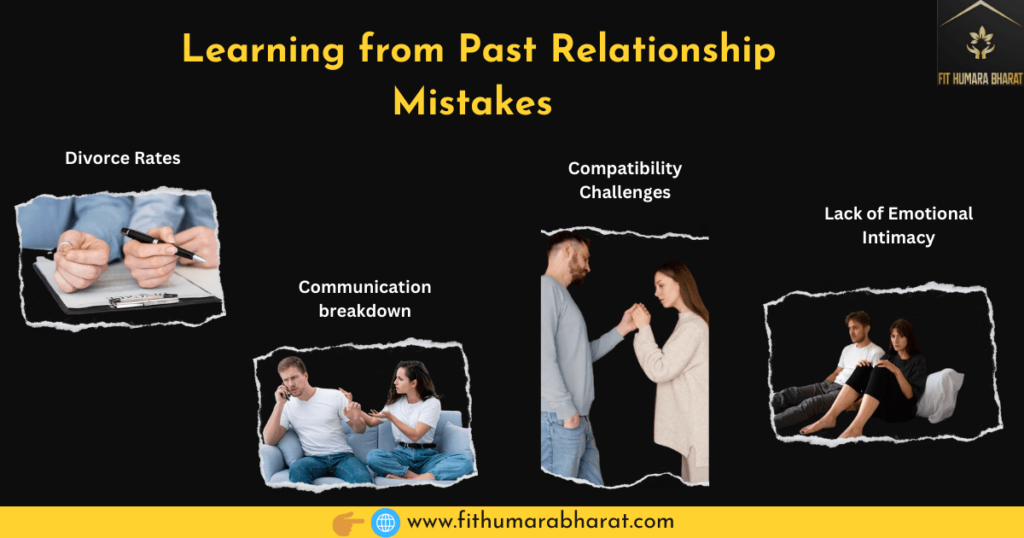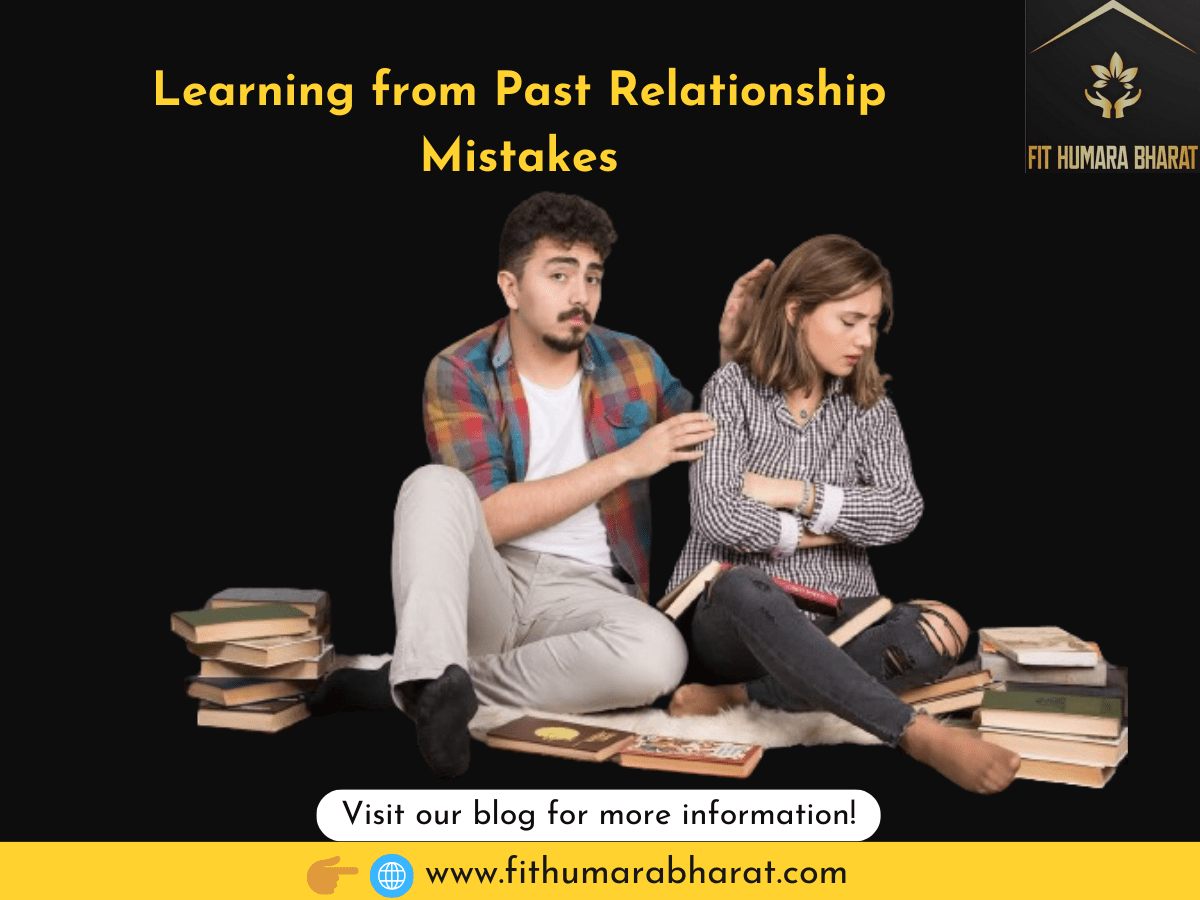The intricate ballet of emotions, communication, and compatibility is a relationship. Errors and mishaps are bound to happen as we go through the highs and lows of love. Nonetheless, there is great benefit to reviewing previous relationship experiences, recognizing the trends that resulted in errors, and applying those insights to future relationships.
“It is important that we forgive ourselves for making mistakes. We need to learn from our errors and move on.”
Steve Maraboli
In this blog, we’ll discuss the value of reflecting on past relationship blunders and examine some fascinating data that illuminates the nature of contemporary partnerships.

Role of Reflection
Having the capacity to reflect on our experiences, particularly concerning sensitive subjects, is one of the cornerstones of personal development. We can learn much about our behaviors, communication preferences, and emotional triggers from past relationship blunders. Analyzing these factors in depth can be a very effective way to start making changes and improving.
People can spot reoccurring patterns that might have affected a relationship’s breakdown by considering prior errors. This could involve problems like inadequate communication, insufficient emotional closeness, or incompatible values. Equipped with this understanding, people can deliberately disrupt these tendencies and establish more salubrious relationships in the times ahead.
The breakup of a relationship is always challenging. You can feel inconsolable and unsure of how to move on for a while. You could even question whether you’ll find the “right” person.
Your previous relationship likely had both positive and negative aspects. Those things can serve as teaching opportunities for you. Your previous relationship guide you in discovering more about yourself and the type of person you wish to spend time with. They’ll also help you avoid previous blunders so you don’t repeat them. Let’s examine how you might avoid making the same mistakes in your relationships by learning from them.
Think About What Went Wrong 🤔
Admitting the mistakes made in a previous relationship can sometimes be the most challenging step towards learning from it. It’s simple to assign blame and place all the burden on your ex-partner. Relationships do occasionally terminate due to one individual. However, it usually takes two for a partnership to fail.
It’s not exactly “fun” to acknowledge some of the issues that have arisen in your previous relationships, and it may need more effort than you anticipate. However, when you begin to understand what went wrong, you might also identify patterns that might be more detrimental to your romantic life than beneficial. Breaking those patterns in the future will be simpler if you are aware of them. Perhaps you have trouble with irrational expectations. Maybe you find yourself drawn to a specific “type” of person who harms you. Even though it hurts, being more aware will help you avoid repeating those bad habits in your future relationship.
Don’t Start 🚫 Dating Until You’re Ready
Immediately entering a new relationship after ending one is one of the worst blunders you can make. The “timeline” for when you should resume dating is not set in stone. But it’s crucial to give oneself enough time to recover and think. If you get right into the dating scene, you will have less time to consider why your previous relationship might not have worked out. You have a higher chance of running into the same issues again.
Recognize Red Flags Early
Everyone tries to present themselves in the best possible light when dating. Getting to know someone may take a few months of consistent dates. But it’s critical to be alert for warning signs immediately. Avoid becoming distracted by the butterflies and excitement you may be feeling and fail to notice potentially dangerous traits in front of you. That does not imply that you should overthink a potential spouse. However, wait to elevate them, too.
Learning from Past Relationship Mistakes
Now let’s examine some startling figures that demonstrate how common relationship problems are and how crucial it is to grow from them:
1. Divorce Rates:
Based on current data, in America almost between 40 and 50 per cent couples end up divorcing. This figure shows the fact that a sizable percentage of marriages terminate in divorce. Even though divorce may not always be viewed as a mistake, knowing its reasons can offer essential insights into the dynamics of relationships.
2. Communication breakdown:
According to studies, poor communication is one of the main reasons why relationships end. Approximately 65% of couples say their main source of dissatisfaction is poor communication. Acquiring the vital talents of proficient communication, articulating wants, and attentive listening can significantly influence the prosperity of a partnership.
3. Lack of Emotional Intimacy:
It is compulsory to have emotional intimacy in relatinships. One of the most important lessons learned from the past is the value of emotional connection and how important it is to prioritize. But surprisingly almost, 25% of couples say they feel emotionally cut off from their partners.
4. Compatibility Challenges:
Around 45% of divorcing couples confirmed that their basic incompatibility was a contributing issue. Comprehending the significance of mutual values, objectives, and passions can assist people in making better decisions when entering into new partnerships.

Applying Lessons Learned:
Now that people are more aware of many couples’ difficulties, how can they use these insights in their own lives?
1. Cultivate Self-Awareness:
Reflecting on past mistakes takes a transforming level of self-awareness. Recognizing one’s limitations, triggers, and communication preferences is part of this.
2. Communication Skills:
Since people understand the adverse effects of poor communication on relationships, they actively focus on strengthening their communication skills. This could entail practicing straightforward communication of wants and feelings, paying attention to what a partner says, and working towards solutions as a team.
3. Prioritize Emotional Intimacy:
Realising the value of emotional intimacy helps refocus attention from the surface-level details of a relationship to the more thoughtful emotional ties. openness, sympathy, and a willingness to open up and share one’s inner world with a partner are necessary for developing emotional closeness.
4. Assess Compatibility:
A starting of new relations required, to consider your values, objectives, and hobbies. People can choose partners who share their ideals more by taking note of the statistics on compatibility issues.
Although errors will inevitably occur on the path of love, they need not determine the nature of our subsequent relationships. People can create the foundation for happier, healthier relationships by reflecting on the past and using the lessons they have learned. The figures highlight the universality of relationship troubles and provide insight into couples’ frequent difficulties. Ultimately, people can escape harmful behaviors and create enduring, meaningful relationships by developing self-awareness, communicating better, emphasizing emotional connection, and determining compatibility.
Thank You 🙏
- The Changing Landscape of Love and Marriage
- Well-Being and Romantic Relationships: A Systematic Review in Adolescence and Emerging Adulthood
- Addicted to love: What is love addiction and when should it be treated?
- Medical scientists and intimate relationships: translating the language of love
- A Developmental Perspective on Young Adult Romantic Relationships: Examining Family and Individual Factors in Adolescence

